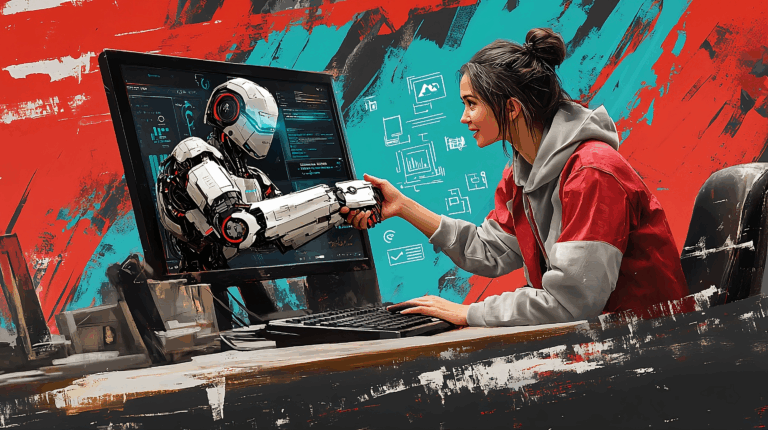2024 is a year where personal and professional growth takes center stage! Whether you’re kickstarting your career, looking to stay ahead in your field, or simply keen to learn new things, the journey of learning and upskilling is essential. This blog explores why learning and upskilling are more important than ever, outlines effective strategies for professional development, including how to choose the topics for your personal upskilling, and helps you set achievable goals for continuous learning, making 2024 a landmark year for learners everywhere.
AI and the Necessity of Upskilling
Let’s start with the basics: what exactly are learning and upskilling? Learning is the broad umbrella under which we acquire new knowledge, skills, and attitudes. It can happen anywhere – in a classroom, on the job, or even when watching TV. Upskilling, on the other hand, is a bit more specific. It’s about leveling up your existing skills or acquiring new ones to stay relevant and thrive in your career.
With advancements in Artificial Intelligence (AI) and software platforms, the skills that were in demand just a year ago are already different from what’s needed today. According to the World Economic Forum, almost a quarter of jobs (23%) are expected to change in the next five years, with 69 million new jobs created and 83 million eliminated.
This shift stresses the importance of upskilling; staying relevant and actively participating in the evolving job market is crucial. As AI and automation reshape job roles and industries, there’s a growing demand for AI-savvy workers that can work faster and better alongside the computers, bots, and new technologies.
While some old professions were already disappearing and being replaced by technology and tech talent, the AI revolution is also impacting the tech sector.
Particularly in areas like software development, cybersecurity, and data analysis, the constant need for tech talent meets the new requirement for AI-awareness, and professionals need to up their game to get new jobs or keep their current ones. At the same time, there’s also a growing need for human skills that AI is still lacking, such as creativity, critical thinking, and emotional intelligence. Upskilling is thus a strategic move to safeguard your career against outdatedness and to tap into new and emerging opportunities.
In addition to adapting to job market changes, learning and upskilling also serve the purpose of broadening horizons and acquiring new knowledge. There’s a real risk of becoming overly reliant on technology tools, potentially dulling our problem-solving and critical thinking skills. It’s important, therefore, not to let technology do all the work for us, but rather to learn how to effectively implement it in our jobs.
How to Choose the Topics for Your Personal Upskilling
The first step in choosing the topics for your upskilling journey is identifying the areas where growth is most needed and beneficial. This requires a careful assessment of your current skill set and how it aligns with your career goals and industry trends. For instance, if you’re in marketing, you might focus your next learning effort on digital marketing techniques like SEO. In IT, you might explore the latest in cloud computing or cybersecurity. It’s about understanding the intersection between your interests, your industry’s future, and the skills that are in high demand. This approach ensures that you don’t stand still and that the time and effort you invest in upskilling bring benefits to your professional journey.
Choosing the right topics for your upskilling journey involves a blend of self-reflection, research, and outreach:
- Start by mapping your interests – what subjects draw your attention in articles or discussions with friends?
- Then, evaluate your current job role: identify any skill gaps you might have.
- Look ahead to the next step in your career path, and consider what skills you need to bridge the gap from your current position to your desired role.
- Networking is also very important; find mentors or industry leaders who inspire you, perhaps on platforms like LinkedIn, and observe the skills they’ve acquired.
- Consult with AI tools like ChatGPT, which can act as your career advisor and upskilling expert. If you’re using ChatGPT Plus, try Wai Wai – a customized version of ChatGPT tailored to provide answers about Wawiwa, reskilling, and upskilling. Share your current role and aspirations, and seek its recommendations.
The key is learning anytime, anywhere – being open to gaining knowledge in various forms and from diverse sources to shape your unique upskilling path.
Strategies for Professional Development
Technology has made learning more accessible than ever before. You have the power to fuel your professional development right at your fingertips. With resources like YouTube for tutorials, ChatGPT for instant information and advice, e-books that cover every imaginable topic, engaging podcasts that keep you informed on the go, and webinars that bring insights from industry leaders directly to you, staying ahead of the game has never been easier. This self-guided approach allows you to tailor your learning experience to your specific needs and available time.
Another option for professional development is self-paced online courses. These courses offer flexibility, allowing learners to progress at their own speed and fit their learning around their existing schedules. This method is particularly beneficial for those with irregular work hours or significant personal commitments. However, self-paced learning requires a high degree of self-discipline and motivation, and it might not be ideal for everyone. Without the structured timelines of a traditional synchronous live course, some learners might find it challenging to understand materials, maintain consistent progress, and stay engaged over time. This is where live upskilling programs can provide a balanced approach.
Upskilling programs, whether online or in-person, offer learning experiences that can boost your professional capabilities. These programs, often spanning just a few weeks or months, are crafted to provide knowledge and practical skills in specific areas. These programs are ideal for those who prefer hands-on learning and direct interaction with instructors and peers. Regardless of the format, most online and face-to-face upskilling programs are designed to fit alongside your existing work commitments, ensuring that you can enhance your skills while maintaining your professional responsibilities. This flexibility makes upskilling a practical and achievable goal for working professionals seeking to advance their careers.
Remember that whichever route you choose – be it self-directed learning, self-paced online courses, live upskilling programs, or a combination of these – the key is to always embrace a learning mindset. In your professional life, don’t just complete tasks to tick them off your list; approach each as a learning opportunity, a chance to grow and refine your skills. Embrace mistakes in both your studies and work as valuable lessons; they are often the stepping stones to deeper understanding and expertise. Keeping a journal or notes can be incredibly beneficial. Calendar reminders too. Simply jot down your goals, reflect on your progress, and track the insights you gain along the way. This habit helps in cementing new knowledge and in planning and achieving your future objectives.
Wawiwa Tech’s Upskilling Programs
Wawiwa is a tech education provider offering reskilling and upskilling programs tailored to the latest industry trends. Wawiwa equips people with the most up-to-date knowledge and tools in areas like Full-Stack Development, Data Analysis and Cybersecurity. Whether you are looking to update your existing knowledge or learn entirely new skills, Wawiwa’s long programs and shorter courses are designed to equip you with everything you need to succeed in your role and bring continuous learning forward.
Wawiwa programs combine frontal and online lectures, cutting-edge content, hands-on practice, and soft skills development to ensure that students get an engaging and effective tech training. These programs and courses are designed to be accessible and manageable alongside professional commitments, providing a balanced approach to learning for those seeking to advance their careers while maintaining their work responsibilities.
Conclusion
Embracing a continuous learning mindset is key – it’s about acquiring new knowledge, integrating this knowledge into your daily work, learning from every experience, and continuously setting and revising your goals. This proactive approach to professional development ensures career success as well as personal fulfillment. Remember, every step in your learning journey is an investment in your future, equipping you to meet the challenges and seize the opportunities that lie ahead.



